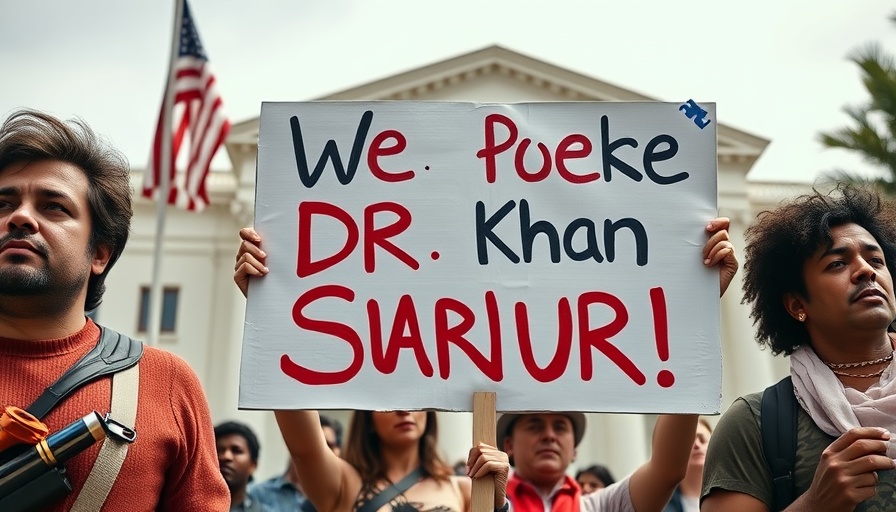
The Significant Ruling for Free Speech Rights
In a landmark decision, a federal judge has ordered the release of Badar Khan Suri, a Georgetown University scholar from India, who was detained as part of the Trump administration's controversial immigration crackdown. This ruling not only reflects on the challenges faced by international students in the U.S. but also emphasizes the critical importance of the First Amendment, which safeguards free speech, irrespective of one's citizenship status. The judge underscored that Khan Suri's social media posts related to Gaza should be viewed as protected political speech, marking a significant development in the ongoing discourse about free expression in the U.S.
Understanding the Context of Immigration Enforcement
The background of this case sheds light on more than just Khan Suri's personal ordeal. Under the Trump administration, there was an intensified focus on cracking down on immigration, especially regarding foreign students. Khan Suri's detention was seen as a direct result of his online presence, which government officials alleged linked him to Hamas due to his wife's Palestinian heritage. This raises important questions about how political affiliations and social media activity can drastically affect someone's residency status and highlights ongoing tensions in U.S. immigration policy.
The Broader Implications of the Case
This case touches upon broader implications for international students in the U.S. The apprehension surrounding their freedom of expression underpins a climate where cultural and political affiliations can lead to dire consequences, such as detention or deportation. The ruling by Judge Patricia Tolliver Giles is a powerful statement against the criminalization of dissenting voices, which is crucial for a nation that prides itself on being a bastion of democracy and free speech.
Human Aspect: Voices in the Silence
For the family of Khan Suri, this is not just a legal battle—it is a deeply personal struggle. His wife, Mapheze Saleh, has been vocal and visible in advocating for his release, often seen holding signs that call for his freedom. The emotional toll on families caught in the web of immigration enforcement cannot be overstated. These cases often involve immense strain on loved ones who fear losing their kin to bureaucratic processes. The emotional resonance of this situation brings forth a human element that elicits empathy and calls for advocacy.
Legal Precedents and Future Responses
This decision could set a significant precedent regarding the treatment of international students and the acknowledgment of their rights under the Constitution. Khan Suri's case is a pivotal moment that may mobilize other affected individuals to pursue justice and highlight the need for reform in immigration enforcement practices. If his subsequent petitions are successful, it could pave the way for a more supportive environment for international scholars in the U.S.
Counterarguments: A Look at Diverse Perspectives
While advocates celebrate this ruling as a victory for free speech, critics argue that the legal system must prioritize national security concerns. They contend that the government's actions were justified in the face of potential threats. Balancing security with individual rights remains an ongoing debate in American society, illustrating the essential dialogue surrounding the complexities of immigration and national policy.
Taking Action: The Role of Advocacy in Immigration Cases
Citizens and activists can rally in support of individuals like Khan Suri who face wrongful detention. Engaging with organizations like the American Civil Liberties Union can provide resources for advocacy—whether through petitions, public demonstrations, or awareness campaigns. Community support is vital for those navigating the complexities of immigration law, transforming individual struggles into collective movements. This case is emblematic of a larger battle over immigrant rights, free speech, and the persistent fight for justice.
In conclusion, as Khan Suri awaits further developments in his case, the implications of this ruling resonate beyond one individual's situation. The broader discourse on free speech, civil rights, and the treatment of immigrants continues to evolve, urging society to reflect on the balance between security and liberty. How we respond to these challenges today will inform the landscape of tomorrow's America.
 Add Row
Add Row  Add
Add 




 Add Row
Add Row  Add
Add 

Write A Comment